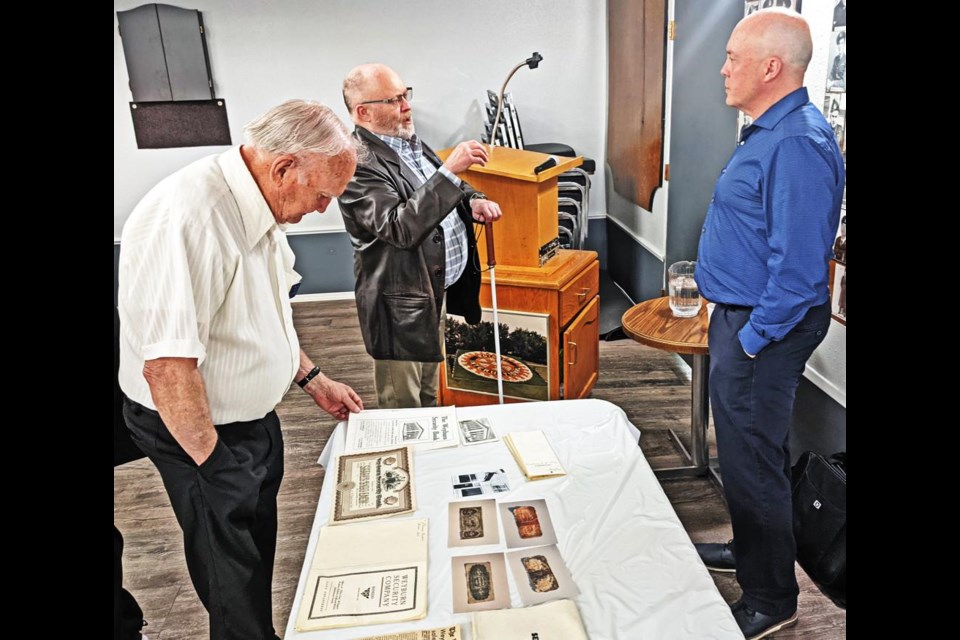WEYBURN – A long-standing Weyburn company has ties going back to the early days of the community, including operating Canada’s smallest chartered bank with its own currency.
Current managing director Jim Onstad of the Weyburn Security Company gave a historical overview of the company and the bank to the Weyburn Rotary Club on Thursday, and had a display of items from the company’s history.
He noted from the outset that while they had the same group of owners and managers, the Weyburn Security Bank operated as a separate entity from the Weyburn Security Company, and came along in part from farmers coming to the company’s lumber yard and asking them to hold money for them in the company’s safe.
The start of everything for the company was in 1899, when six Americans came to Weyburn and joined with local realtor Joe Mergens to first form the Canadian Investment Company, which became the Weyburn Security Company in 1902, formed as a partnership.
The group bought up some 50,000 acres in the area to sell to settlers in the southeast, with the partners having some banking experience, coming from Minnesota, Wisconsin and South Dakota.
“After being in the area, they saw a need for private banking and land development, and they formed this partnership,” said Onstad, whose grandfather and father were both involved with the company throughout their lives before he took over as managing director in 2000.
“Farmers would come in and asked them to hold on to their money in the safe at the lumberyard, and that spurred some different ideas,” he said, noting with their banking experience in the States, the partners knew how the system worked.
The company grew quickly in those early days, with Weyburn Security Company having branches in McTaggart, Yellow Grass, Midale and Halbrite by 1906. This was also the year they hired H.O. (Harry) Powell as their manager, and he continued the growth in the coming years.
“He was quite an interesting man,” said Onstad. “He was a well-liked and respected man, and they said he had a way of putting confidence in the residents of the area.”
By 1908, the company grew to have branches in Colgate, Griffin and Radville, and by 1910, the Weyburn Security Bank was set up as a separate business, building on the prosperity and confidence of the farmers of the southeast area.
“Powell had a highly personalized style of banking, and he was out and about getting to know people,” said Onstad, noting the style of other bank managers who were driven out in chauffeur-driven cars to impress the farmers. “Powell was quite the opposite, as he got on the same level as the farmers and established relationships.”
The Weyburn Security Bank building was built in downtown Weyburn in 1910 as the headquarters of the business. Today it is the current home of the CIBC bank.
As they wanted to open operations of the bank with their own currency, they were granted a charter on May 4, 1910, and the bank notes were granted by Dec. 19 the same year. Thus when operations began on Jan. 2, 1911, they had their own currency in denominations of $5, $10 and $20 bills.
“This was the first chartered bank in Saskatchewan, and they originally applied to be the Saskatchewan Bank, but that fell through,” said Onstad, noting they took over nine offices of the Weyburn Security Company. The company continued to operate, with the bank employees working as agents of the company.
In the 1920s, the “Weyburn Amendment” was made to the province’s Bank Act, as they were the only bank to be granted revenue from hail insurance, which they sold to farmers in the area.
At one point in the 20s, there was an estimated $725,000 in Weyburn Security bills circulating in the southeast – and today, the bills are rare, with about 50 bills in existence right now, said Onstad, explaining they burned bills anytime they began to look worn and frayed, as they wanted the bills to always look crisp and new.
A set of all three denominations in good condition would be worth around $65-70,000 today.
Powell moved to have the Weyburn Security Company incorporated in 1926, and Onstad noted this most likely saved the company and allowed it to operate through the tough times that rose up with the Great Depression and spelled the end of the Weyburn Security Bank.
In 1927-28, the bank paid four per cent interest on deposits compared to the three per cent of most other banks. At their peak of success, they had 30 branches throughout southern Saskatchewan.
The stock market crash hit in 1929, and coupled with crop failures and the Dust Bowl, and it was announced in January of 1931 that “Canada’s smallest chartered bank” was sold. (Later, in 1961, the Imperial Bank merged with the Commerce Bank to form the Canadian Imperial Bank of Commerce, or CIBC, as it is known today.)
Jim’s grandfather, Albert Onstad, was manager from 1948 to 1967, after initially starting with the company in McTaggart from 1927 to 1933, and his father Jack was manager from 1973 to 2000, when he took over. Currently, his son Mike works with him as the fourth generation of Onstads, and is in his ninth year as the assistant manager.
As a note of historical interest, his grandfather met his wife Alice McGowan in McTaggart where she was a teacher, and they were married around 1927-28. She was the daughter of Henry McGowan, who was Weyburn’s first postmaster.
Albert was also a mayor of Weyburn, even though he didn’t run for the position. Onstad said he was asked to serve after Mayor Jun Staveley had stepped down before the end of his term.




